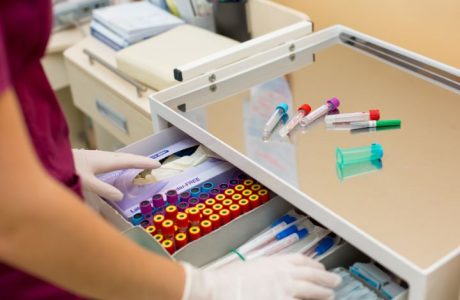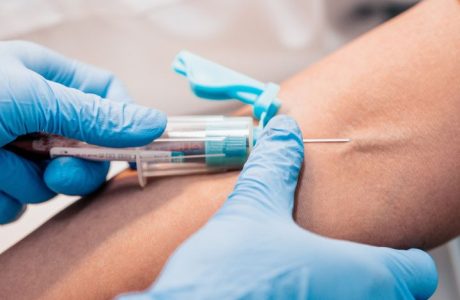Are you considering phlebotomy training but unsure what to expect? Considered a fast-growing healthcare profession 1, becoming a phlebotomy technician can offer stability, hands-on experience, and the opportunity to make a difference in patients’ lives. In this guide, we’ll walk you through what you can get out of a quality phlebotomy training program, the skills you can gain, and the career opportunities available after completing your program.
Explore Phlebotomy Training at Training Direct
What is Phlebotomy Training?
Phlebotomy training prepares people to become skilled professionals responsible for drawing blood for medical testing, transfusions, and donations. The training aims to teach you the key skills you’ll need for success at work. Phlebotomists play a crucial role in healthcare settings by:
- Ensuring blood samples are properly collected and labeled
- Maintaining patient safety
- Helping patients feel at ease during blood draws
- Keeping work areas sanitary
Training programs focus on both theoretical knowledge and practical skills to equip students with the expertise needed to succeed in the field. From drawing blood to communication skills, you’ll learn about a wide variety of topics if you choose to enroll in phlebotomy training.
Key Components of Phlebotomy Training Programs
Phlebotomy training programs vary by institution but typically cover the following essential topics:
- Anatomy and Physiology: Understanding the circulatory system, veins, and best practices for venipuncture.
- Medical Terminology: Learning the language used in healthcare settings to communicate effectively.
- Infection Control and Safety Procedures: Following proper protocols to prevent contamination and maintain a sterile environment.
- Venipuncture Techniques: Mastering the skill of drawing blood efficiently and safely.
- Specimen Collection and Handling: Ensuring proper labeling, storage, and transportation of blood samples.
- Patient Interaction and Communication: Learning how to ease patient anxiety and provide excellent care.
- Legal and Ethical Considerations: Understanding patient rights, consent procedures, and compliance regulations.
If you decide to research different phlebotomy training programs near you, make sure the curriculum looks complete and well-rounded in these areas. This can help you narrow down which program is right for you and your career goals.
What to Expect During Your Training Journey
Enrolling in a phlebotomy training program means you’ll be engaging in a combination of classroom instruction and hands-on practice. Here’s what a typical training journey looks like:
- Classroom Training: You’ll start by learning fundamental concepts in phlebotomy such as human anatomy, infection control, and medical ethics.
- Hands-on Training: Now it’s time to practice what you’ve learned! Most phlebotomy tech training programs include a clinical component where students practice venipuncture techniques on training dummies and eventually on real people under supervision. This hands-on experience is crucial in building confidence and precision.
- Certification Preparation: Many employers prefer or require phlebotomists to be certified. After completing your training in phlebotomy, students may prepare for certification exams such as those offered by the National Healthcareer Association (NHA) or the American Society for Clinical Pathology (ASCP).
How long will this take? That depends on the phlebotomy training program you choose. Most programs can be completed within a few weeks to a few months. This means you can start your healthcare career in a relatively short time compared to other medical professions.
Career Paths after Phlebotomy Training
Once you’ve completed your phlebotomy training, a variety of career opportunities await you. Some of the most common settings where phlebotomists work include:
- Hospitals: Assisting with patient care and working with diverse medical teams.
- Diagnostic Laboratories: Collecting and processing blood samples for medical testing.
- Blood Donation Centers: Facilitating blood donations and ensuring proper collection procedures.
- Physician’s Offices and Clinics: Supporting healthcare providers in routine blood draws and patient care.
- Mobile Phlebotomy Services: Traveling to patients’ homes, nursing facilities, or corporate wellness events.
With experience (and perhaps additional training/education), phlebotomists can advance into supervisory roles, become medical laboratory technicians, medical laboratory assistants, or even pursue further education in nursing or other healthcare fields.
Take the first step towards pursuing your phlebotomy training
If you’re ready to start your journey in the healthcare industry, enrolling in a phlebotomy tech training program is an excellent first step. At Training Direct, we offer a phlebotomy training program designed to provide students with the knowledge and hands-on experience they need to succeed at our campus in Bridgeport. Our classes cover essential topics such as infection control, venipuncture procedures, and patient care, all taught by experienced professionals. Our goal is to equip students with the skills they need to enter the workforce confidently and make a positive impact in healthcare.
Don’t wait—take the first step toward a fulfilling career in phlebotomy today! Contact Training Direct to learn more about our phlebotomy training program and start your journey in healthcare.





